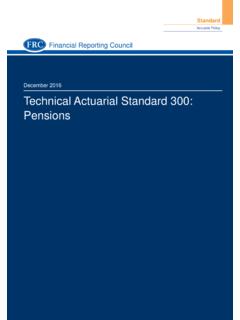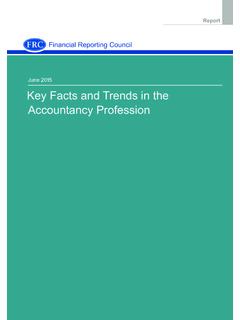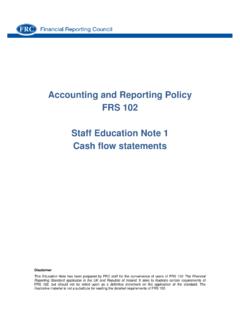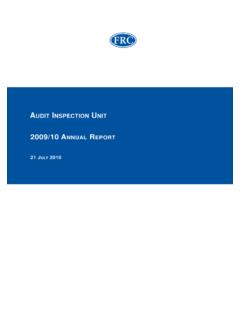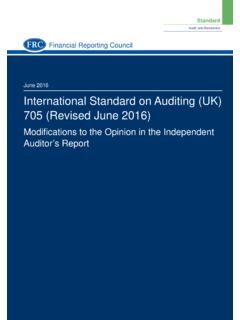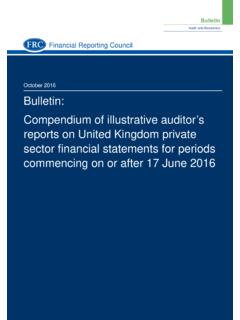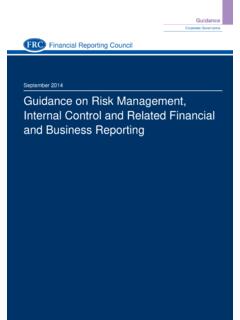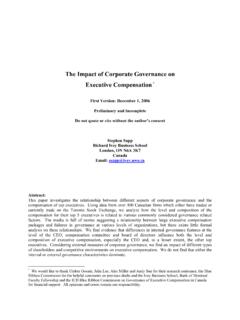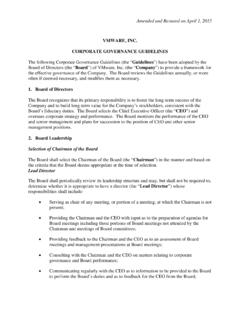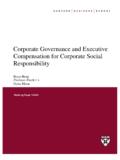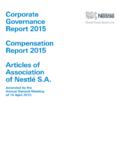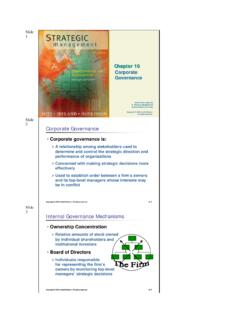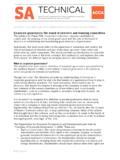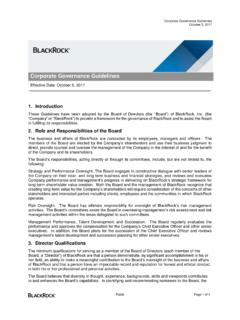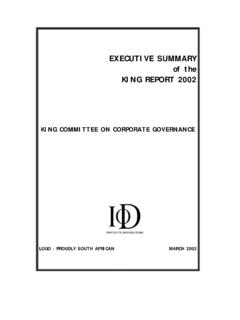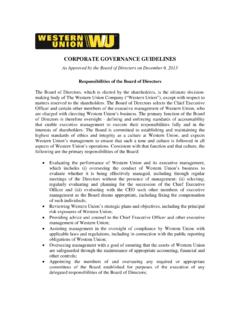Transcription of Financial Reporting Council - FRC
1 CodeCorporate GovernanceApril 2016 The UK corporate governance CodeFinancial Reporting CouncilThe FRC is responsible for promoting high quality corporate governance and Reporting to foster investment. We set the UK corporate governance and Stewardship Codes as well as UK standards for accounting, auditing and actuarial work. We represent UK interests in international standard-setting. We also monitor and take action to promote the quality of corporate Reporting and auditing. We operate independent disciplinary arrangements for accountants and actuaries, and oversee the regulatory activities of the accountancy and actuarial professional FRC does not accept any liability to any party for any loss, damage or costs howsoever arising, whether directly or indirectly, whether in contract, tort or otherwise from any action or decision taken (or not taken) as a result of any person relying on or otherwise using this document or arising from any omission from it.
2 The Financial Reporting Council Limited 2016 The Financial Reporting Council Limited is a company limited by guarantee. Registered in England number 2486368. Registered Offi ce: 8th Floor, 125 London Wall, London EC2Y 5AS Financial Reporting Council Contents .. Page governance and the code .. 1 Preface .. 2 Comply or Explain .. 4 The Main Principles of the code .. 5 Section A: Leadership .. 7 Section B: Effectiveness .. 10 Section C: Accountability .. 16 Section D: Remuneration .. 20 Section E: Relations with shareholders .. 22 Schedule A: The design of performance-related remuneration for executive directors .. 24 Schedule B: Disclosure of corporate governance arrangements .. 25 The UK corporate governance code (April 2016) Financial Reporting Council 1 governance and the code 1.
3 The purpose of corporate governance is to facilitate effective, entrepreneurial and prudent management that can deliver the long-term success of the company. 2. The first version of the UK corporate governance code (the code ) was produced in 1992 by the Cadbury Committee. Its paragraph is still the classic definition of the context of the code : corporate governance is the system by which companies are directed and controlled. Boards of directors are responsible for the governance of their companies. The shareholders role in governance is to appoint the directors and the auditors and to satisfy themselves that an appropriate governance structure is in place. The responsibilities of the board include setting the company s strategic aims, providing the leadership to put them into effect, supervising the management of the business and Reporting to shareholders on their stewardship.
4 The board s actions are subject to laws, regulations and the shareholders in general meeting. 3. corporate governance is therefore about what the board of a company does and how it sets the values of the company. It is to be distinguished from the day to day operational management of the company by full-time executives. 4. The code is a guide to a number of key components of effective board practice. It is based on the underlying principles of all good governance : accountability, transparency, probity and focus on the sustainable success of an entity over the longer term. 5. The code has been enduring, but it is not immutable. Its fitness for purpose in a permanently changing economic and social business environment requires its evaluation at appropriate intervals.
5 6. The new code applies to accounting periods beginning on or after 17 June 2016 and applies to all companies with a Premium listing of equity shares regardless of whether they are incorporated in the UK or elsewhere. 2 The UK corporate governance code (April 2016) Preface 1. Over two decades of constructive usage of the code have contributed to improved corporate governance in the UK. The code is part of a framework of legislation, regulation and best practice standards which aims to deliver high quality corporate governance with in-built flexibility for companies to adapt their practices to take into account their particular circumstances. Similarly, investors must take the opportunity to consider carefully how companies have decided to implement the code .
6 There is always scope for improvement, both in terms of making sure that the code remains relevant and improving the quality of Reporting . 2. Boards must continue to think comprehensively about their overall tasks and the implications of these for the roles of their individual members. Absolutely key in these endeavours are the leadership of the chairman of a board, the support given to and by the CEO, and the frankness and openness of mind with which issues are discussed and tackled by all directors. 3. Essential to the effective functioning of any board is dialogue which is both constructive and challenging. The problems arising from groupthink have been exposed in particular as a result of the Financial crisis. One of the ways in which constructive debate can be encouraged is through having sufficient diversity on the board.
7 This includes, but is not limited to, gender and race. Diverse board composition in these respects is not on its own a guarantee. Diversity is as much about differences of approach and experience, and it is very important in ensuring effective engagement with key stakeholders and in order to deliver the business strategy. 4. One of the key roles for the board includes establishing the culture, values and ethics of the company. It is important that the board sets the correct tone from the top . The directors should lead by example and ensure that good standards of behaviour permeate throughout all levels of the organisation. This will help prevent misconduct, unethical practices and support the delivery of long-term success. 5. This update of the code has been driven by the consequential changes required from the implementation of the European Union s Audit Regulation and Directive.
8 Section on Audit Committees was reviewed to ensure it remained consistent and changes have only been made when necessary. It is important that companies view these changes alongside the revised Guidance on Audit Committees. 6. Following the 2014 code amendments, which focussed on the provision by companies of information about the risks which affect longer term viability, the FRC will continue to monitor compliance with these changes. Companies should be presenting information to give a clearer and broader view of solvency, liquidity, risk management and viability. For their part, investors should assess these statements thoroughly and engage accordingly. 7. To run a corporate board successfully should not be underrated. Constraints on time and knowledge combine with the need to maintain mutual respect and openness between a cast of strong, able and busy directors dealing with each other across the different demands of executive and non- executive roles.
9 To achieve good governance requires continuing and high quality effort. 8. Chairmen are encouraged to report personally in their annual statements how the principles relating to the role and effectiveness of the board (in Sections A and B of the code ) have been applied. Not only will this give investors a clearer picture of the steps taken by boards to operate effectively but also, by providing fuller context, it may make Financial Reporting Council 3 investors more willing to accept explanations when a company chooses to explain rather than to comply with one or more provisions. 9. While in law the company is primarily accountable to its shareholders, and the relationship between the company and its shareholders is also the main focus of the code , companies are encouraged to recognise the contribution made by other providers of capital and to confirm the board s interest in listening to the views of such providers insofar as these are relevant to the company s overall approach to governance .
10 Financial Reporting Council April 2016 4 The UK corporate governance code (April 2016) Comply or Explain 1. The comply or explain approach is the trademark of corporate governance in the UK. It has been in operation since the code s beginnings and is the foundation of its flexibility. It is strongly supported by both companies and shareholders and has been widely admired and imitated internationally. 2. The code is not a rigid set of rules. It consists of principles (main and supporting) and provisions. The Listing Rules require companies to apply the Main Principles and report to shareholders on how they have done so. The principles are the core of the code and the way in which they are applied should be the central question for a board as it determines how it is to operate according to the code .
